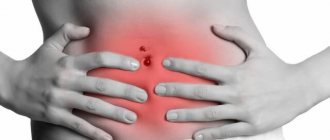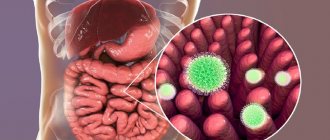The effect of coffee on the digestive system
Coffee can cause stomach pain if a person drinks a lot of it on an empty stomach and forgets to have a snack. Add here lack of sleep, nervous stress, poor irregular nutrition, then we can assume irritable bowel syndrome: most of the patients are women who do not go to the doctor for treatment, although degenerative tissue changes occur inside.
Average age 30 – 40 years. People prone to mental disorders - panic attacks, phobias, depression - get sick more often. In addition to abdominal pain, there is gastroesophageal reflux disease, stool disorders - constipation or diarrhea. Caffeine may worsen symptoms in such cases.
If your stomach hurts after coffee, this makes it clear that you need to temporarily exclude this drink and monitor your well-being. The fact is that irritable bowel syndrome begins in the stomach; if left untreated, the disease spreads to the small intestine.
At first, few people pay attention to the dehydrating effect of coffee. At a young age, the body copes by removing water from the skin and intercellular fluid.
With age, people whose gastrointestinal tract initially works worse begin to notice that many foods and drinks somehow have an incorrect effect on their well-being. This is a signal to review your habits, diet and the amount of water you need to drink per day.
Coffee dehydration affects not only the stomach, but also the pancreas. It regularly synthesizes digestive juices, which consist of 99% water. If there is not enough fluid, digestion will be incomplete.
If you drink on an empty stomach
Chlorogenic acid, which is found in coffee beans, stimulates the production of hydrochloric acid. If this happens on an empty stomach, heartburn or damage to the stomach lining is possible. The presence of hydrochloric acid in the stomach without food gradually leads to gastritis.
People who want to lose weight brew green ground grains. The effect is known: a person can go without food for half a day, although this is not so beneficial for an empty stomach.
If you rarely drink coffee on an empty stomach, then most likely there will be no problems. With constant consumption of caffeine and organic acids contained in grains, there is a chance to seriously disrupt the functioning of the gastrointestinal tract.
The benefits and harms of coffee
The main purpose of drinking the drink is to obtain energy. Caffeine accelerates cardiac activity, has a strong effect on the nervous system, enhances conditioned reflexes, reactions, and gives vigor. The effect is a couple of hours. This is because store-bought grains and powders are made from leftover processed grains. They contain a substance that causes vigor for a short time, then the effect becomes the opposite. Instant coffee is most susceptible to this. Whole processed grains are used for energy drinks.
Harm from frequent consumption of the “energy drink”:
- Exhaustion of the nervous system.
- Constant fatigue develops.
- Apathy.
- Depression.
- Severe and frequent headaches.
- Nausea, feeling of stomach discomfort.
- Pain in muscles, joints.
- Dependence – for a tonic effect, a person requires an increased dose each time.
Consuming a balanced amount provides benefits:
- Two cups a day (the generally accepted daily norm) reduces the risk of cancer of the liver, colon, rectum, and pancreas.
- Prevents the onset of Parkinson's disease, a chronic neurological disease caused by the destruction and death of neurons.
- Reduces the risk of diabetes.
- Increases the activity of sperm in the male body.
- Helps in burning calories while losing weight. A cup before an intense workout will help you exercise more actively. The body uses fats for energy. Carbohydrates remain unused.
- Helps digestion an hour after eating. Otherwise, beneficial minerals will be destroyed.
- Reduces the risk of asthma, migraines, heart attack, liver cirrhosis, atherosclerosis (blood vessel disease), stomach stones, hypertension (high blood pressure).
- In medicine, caffeine is used for diseases of the nervous system, infectious diseases, cardiovascular failure and vascular spasms. It is included in tablets that treat the above pathologies.
Gastrointestinal diseases for which you should not drink coffee
In addition to irritable bowel syndrome, there are other diseases of the digestive system for which you should not drink coffee. As a last resort, brew it very weakly, but for a coffee lover, weak espresso will not bring any pleasure, so it is better to refuse altogether.
Stomach and duodenal ulcers
Why coffee makes your stomach hurt - the cause may be damage to the mucous membrane, in other words - ulcers on the inner surface. Most likely, the person knows about his problem, but ignores the doctors’ warnings. This sometimes ends in a painful attack and forces the person to give up all prohibited foods.
With an ulcer, excess hydrochloric acid in an empty stomach is an exacerbation. Sick people are forced to eat on a schedule and not go hungry. The list of products is also limited. Coffee, especially instant coffee, is strictly prohibited, since in addition to organic acids, soluble granules contain artificial acids that corrode the already damaged mucous membrane.
Gastritis
Can coffee cause stomach pain if there is no ulcer? Maybe with gastritis. This disease is considered a pre-ulcer condition and requires diet. The mucous membrane is inflamed during gastritis. The cause is not necessarily nutrition. It is possible that a person's upper gastrointestinal tract is parasitized by Helicobacter pylori, a bacterium that leads to ulcers.
Depending on the state of the immune system, symptoms may be kept under control by the body for a long time. But when immunity decreases, ulcers on the mucous membrane appear quickly and the person is forced to undergo treatment.
Pancreatitis
Inflammation of the pancreas is dangerous because with inflammation and stenosis of the ducts, digestive juices can dissolve the organ from the inside. If a person with an attack of acute pancreatitis is not taken to the hospital in time, partial necrosis of the pancreas and nearby tissues with heavy internal bleeding is possible.
The consumption of prohibited foods and coffee on an empty stomach during inflammation of the pancreas parenchyma is strictly prohibited, especially strong brew, with sugar and fatty milk.
If your stomach hurts after coffee with milk, could this be a symptom of pancreatitis? It may, but it is necessary to conduct an examination to know exactly your diagnosis and adjust your diet.
Exceeding the recommended amount of drink
Another common reason why abdominal pain occurs after coffee is non-compliance with recommendations regarding the amount of drink and its strength. In this matter, of course, everything is very individual and depends on the functioning of your stomach, but general advice should be taken into account.
© shutterstock
So, you should not drink more than three servings a day. At the same time, in the mornings and evenings it is better to limit yourself to just one, and in the lunchtime and afternoon it is permissible to drink two.
Features of symptoms
The symptoms in this case will be similar to the previous ones: stomach pain that goes away on its own within half an hour. However, if the recommended dose is exceeded, other manifestations of the problem may appear : rapid heartbeat and breathing, sweating of the feet and palms, anxiety or agitation, rapid speech and “running” eyes. If the recommended dose is significantly exceeded, an obsessive state or panic attack may occur.
Treatment methods
If the recommended dose is slightly exceeded, you should wait out the condition - a hearty lunch and some time spent at rest will help relieve it. If the dose is significantly exceeded, it is recommended to rinse the stomach.
Cooking methods and effect on mucous membranes
The way you brew coffee beans affects how your body reacts, but not for everyone. If you have a weak stomach or sensitive intestines, you need to choose the optimal concentration of grains and dosage of water so as not to suffer from negative symptoms.
How do different cooking methods affect the reaction of the gastrointestinal tract:
- Turkish coffee. It is considered a very strong drink if brewed correctly. The degree of grinding of the grains is very high, that is, almost dust, which cannot be felt when rubbed with your fingers. This is necessary so that all the essential oils are transferred into the water.
If grounds get into the stomach, it can cause irritation and lead to intestinal upset. In this case, it is better to brew coffee by machine or brew it like tea.
- Machine espresso. Espresso brewed in a coffee machine does not harm a healthy person if he does not abuse the dosage. A cup contains up to 120 mg of caffeine, and the permissible limit is 350 mg per day, that is, 3 servings. If you eat normally, there should be no negative consequences.
The only reason why your stomach turns from coffee is the individual characteristics of the body, because the laxative effect of caffeine is also known. It occurs because the alkaloid draws fluid from the intercellular space into the intestines.
Video: Don't drink coffee on an empty stomach!
Reabsorption does not have time to occur, so the person has the urge to defecate. In this case, it is necessary to drink water before drinking coffee, as well as after it, to reduce the risk of dehydration.
- French press. This is a universal device that prevents grounds from getting into the cup, and also makes it possible to brew a drink of the desired strength. Depending on the infusion time, more or less caffeine enters the liquid. In general, the drink made from a French press is weaker, so if your stomach hurts after coffee, you can get a teapot.
To avoid acids getting into the water, ground grains are infused cold, simply pouring water over them overnight. In the morning, you get an invigorating drink with caffeine, but without the acidic component. You can use a French press for this.
Which doctor should I contact?
We looked at the harm caused by coffee, the causes of stomach pain, and now it’s time to tell you which specialist you should go to in this case. So:
- If your stomach hurts after coffee, you should visit a gastroenterologist.
- If this is not possible, or you are not sure of the causes of pain, visit a general practitioner - therapist.
- If you want to know how much coffee you should drink, as well as advice on other nutrition-related issues, consult a nutritionist.
© shutterstock
Degree of roasting and variety of Arabica - effect on the stomach
After coffee, your stomach hurts if the beans are heavily roasted. In Italy and Spain, it is customary to fry them until black and shiny. From a health point of view, this method is not very good. Many substances oxidize and are no longer beneficial; most vitamins and minerals disappear with strong heat treatment. Roasted essential oils also undergo a lot of changes and are no longer as beneficial.
Arabica is considered a more acidic variety, especially highland ones. The cost of such coffee reaches 300 dollars or more per kilogram. People suffering from gastrointestinal diseases do not make sense to spend that kind of money to get an attack of gastritis, ulcers or pancreatitis. A regular, inexpensive, light-roasted Arabica will do.
Gastritis and peptic ulcer
Another reason why stomach pain may occur after coffee is gastrointestinal diseases such as gastritis and peptic ulcers. They are formed due to long-term adverse effects on the body: most often the cause is either systematic poor nutrition or a person being under constant stress. In such cases, gastritis develops, and then, if the patient does not take any measures to treat the disease, an ulcer occurs.
© shutterstock
Features of symptoms
With gastritis and ulcers, pain occurs not only after coffee, but also after any meal, even a minor one.
Treatment methods
Both of these diseases require observation by a doctor, as well as adherence to a special diet. Coffee in small quantities is allowed only in mild forms of gastritis , however, in more complex cases, as well as in case of peptic ulcer disease, the drink is completely excluded from the patient’s diet.
Pain after instant coffee
Some people get stomach ache from instant coffee. This indicates that a low-quality product was purchased, although the method of producing freeze-dried coffee itself suggests health problems after consuming it. Expensive production involves more investment and less profit from sales.
Unscrupulous producers want to increase profits by replacing natural grains with cheap raw materials - acorns, oats, barley, chestnuts. If a person has an allergy or food intolerance to any component, then he will not know that this product is in instant coffee, hence why his stomach or abdomen hurts after coffee. In addition to counterfeit raw materials, the composition may contain chemicals that restore the taste and aroma of natural coffee.
It’s better to buy high-quality, expensive varieties and not overuse soluble granules. Natural grains are many times healthier and safer.
Individual intolerance to the type of coffee
Another reason why your stomach hurts after coffee is the wrong choice of drink type. A group of specialists experimentally found that some varieties and methods of frying them release more acids during cooking than others. They most often lead to stomach pain.
© shutterstock
These varieties, in particular, include the popular and high-quality Arabica, as well as any light-roasted beans, that is, those that have not been subjected to intensive heat treatment.
Features of symptoms
Pain in the stomach, aching, occurring 5-10 minutes after drinking coffee . They go away on their own within half an hour, but resume at the next similar case. You can find out that the reason is the wrong type of coffee by trying another caffeine-containing drink, for example, a portion of instant coffee.
Treatment methods
If this problem arises, it would be rational to stop drinking the wrong type of coffee and find a similar replacement for it. You can also experiment with the quantity and strength of the drink - perhaps the coffee variety is not suitable for you, but a lower concentration will not cause stomach pain.
Beneficial properties of coffee
Coffee beans contain over 1,200 biologically active compounds, each of which affects the human body in one way or another. Here are just a few of them:
- Amino acids are the basic structural units of proteins.
- B vitamins necessary for the normal functioning of the nervous system.
- Essential oils with antiseptic and disinfectant properties.
- Organic acids (especially chlorogenic acids) in reasonable quantities have a beneficial effect on the gastrointestinal mucosa.
- Iron is necessary for normal hematopoiesis and tissue respiration.
When drinking 1-2 cups of coffee per day (no more), the synthetic and detoxification function of the liver is normalized. The drink is especially useful for patients with liver cirrhosis and chronic hepatitis - in them, coffee additionally slows down the processes of fibrosis.
Causes of stomach pain from coffee drinks
Regular consumption of coffee drinks in large quantities negatively affects the functioning of the entire body. Problems often arise from the central nervous system, heart, and gastrointestinal tract. Sometimes coffee lovers note that after drinking espresso, discomfort appears in the abdominal area. You may even experience heartburn. It’s worth figuring out whether coffee can cause stomach pain and what triggers such changes.
Can coffee cause stomach pain?
Doctors unanimously say that the stomach may hurt after coffee. In addition, it is coffee drinks that provoke pain. Similar symptoms are observed even in people who do not suffer from problems with the gastrointestinal tract.
Often, negative changes are observed against the background of fatigue, stress, psycho-emotional and physical stress, and lack of sleep. Pain syndrome also occurs when drinking espresso on an empty stomach. The likelihood of pain increases significantly when several unfavorable factors are combined.
In the course of a number of studies, it was possible to determine what exactly provokes the appearance of stomach pain. Most often, such problems were observed in the following cases:
- lightly roasted grains. With short heat treatment, the maximum amount of acids remains in the coffee fruit;
- varieties with high acidity. As a rule, Arabica beans that have undergone wet processing have these characteristics;
- prolonged contact of raw materials with water . When brewing a drink in a cup, Turk, or French press, acids and caffeine enter the liquid in large quantities.
Why does pain occur?
Coffee beans contain caffeine and a number of other substances, including chlorogenic acid. When it penetrates the body, irritation of the intestinal walls occurs. At the same time, active synthesis of gastric acid begins, and pain appears. Their occurrence is due to the lack of food in the stomach.
Thus, pain in the abdominal area is observed for the following reasons:
- increased acidity;
- irritation of the intestinal mucosa;
- presence of gastrointestinal pathologies;
- individual intolerance to the components of the drink.
If you continue to drink coffee on an empty stomach, drinking five or more cups a day, there is a risk of caffeine overdose. In addition, systematic irritation of the mucous membranes of the digestive organs leads to gastritis and ulcers.
Natural drink
The natural product has a positive effect on the body. The appearance of pain when consuming it is provoked by coffee grounds. Its presence in the finished drink is noted when the raw material is brewed in a cup and cezve. It is worth trying to temporarily drink the drink from a coffee machine or resort to using special filters that allow you to strain the liquid.
It is recommended to drink espresso with milk. Thanks to this, the negative impact on the gastrointestinal tract is significantly reduced.
Soluble
Abdominal pain after coffee most often occurs when consuming an instant product. It contains a high concentration of caffeine. In addition, there are many chemical compounds present:
- emulsifiers;
- stabilizers;
- dyes;
- flavorings;
- preservatives.
Naturally, these substances negatively affect the functioning of the gastrointestinal tract. This is why pain from instant coffee occurs. And it doesn’t matter at all what type of it is used. The effect of powder, sublimated and granular products is almost the same.
Coffee for an upset stomach
Drinking coffee if you have stomach pain, diarrhea and other gastrointestinal problems is strongly not recommended - the condition will worsen. In addition, additional symptoms will occur:
- increased heart rate;
- increased blood pressure;
- migraine;
- swelling.
Even coffee with milk will not help eliminate pain and diarrhea. When consumed, intestinal upset will only worsen, and the load on the digestive organs will become greater.
If you have an upset stomach, you can drink barley or acorn coffee. True, these products cannot be used as the only means of treatment. During this period, they are considered as an alternative to the classic drink.
What to do
If your stomach hurts after coffee, there is a heaviness in the stomach, or vomiting, it is recommended to give it up for a while or replace it with a safer liquid. There are many plant analogues.
The presence of chronic intestinal problems should also be taken into account. For ulcers or gastritis, coffee intake should be minimized or completely abandoned.
Provided that there are no gastrointestinal pathologies, but after drinking the drink there is pain in the epigastric region, you need to reconsider your attitude towards your favorite liquid.
It is extremely important to observe the measure and adhere to a number of recommendations:
- if pain occurs in the abdominal area, you should immediately eat something or drink water or milk;
- Do not drink espresso on an empty stomach. If you don’t want to eat a big meal, you need to eat at least a cookie or a small piece of cheese;
- It is best to drink a cup of invigorating liquid half an hour after eating;
- if pain occurs systematically after eating an instant product, it should be replaced with a natural one and drunk in smaller portions;
- Lemon will help neutralize the effects of caffeine;
- you should avoid overly strong coffee;
- it is safer to drink a drink with milk, but only if there is no diarrhea;
- The appearance of discomfort is often noted when drinking excessively hot espresso. Therefore, it should be cooled to a suitable temperature.
Coffee drinks can have a beneficial effect on your health. True, only when consumed in moderation and following certain rules.
If you drink large volumes of invigorating liquid, a number of negative changes are observed, and stomach pain often appears.
It is extremely important to give up your favorite espresso for a while, and then drink it in small portions and only some time after eating. Due to this, there will be no harm to the gastrointestinal tract.
Source: https://kofegid.info/zdorove/bolit-zheludok-ot-kofe
Inappropriate time to drink the drink
The first and most common reason why your stomach hurts from coffee is carelessness in choosing the time for a coffee break. Everyone knows that caffeine has a very strong effect on the body, and coffee beans contain, among other things, a large amount of acids. This “explosive” composition causes discomfort if it is consumed on an empty stomach - when mixed with gastric juice, the substances form an acid-base environment that is extremely dangerous for the gastric mucosa.
This leads to unpleasant sensations and pain, like gastritis. However, frequent drinking of coffee on an empty stomach is one of the most common causes of gastritis these days.
How to solve a problem?
Coffee is a beloved and respected drink all over the world. Many are accustomed to starting the morning with him, solving business issues with him, making acquaintances, discussing family matters. It is not necessary to deprive yourself of aromatic pleasure forever; the main thing is to learn to listen to your body. If he gives signals, reacting with pain to coffee breaks, you should reconsider your habits and choose a higher quality drink, abandoning soluble powder compounds.
You can do no harm to your body and enjoy a cup of aromatic coffee; the main thing is to do it at the right time, without skimping on the quality of the drink.
An additional plus is useful additives, for example, cinnamon, milk, lemon, which, by the way, partially neutralizes the effect of caffeine. And most importantly, you should forever forget about coffee immediately after sleep and after meals.
If following the recommendations for drinking and choosing coffee does not help, you should take a closer look at plant-based analogues that are safe for the body. Barley coffee drink and chicory will not only do no harm, but will also help get rid of a number of health problems.
Many people notice that sometimes coffee causes stomach pain and in some cases heartburn, because it affects not only the central nervous system, but also the gastrointestinal tract. Most often, the problem arises due to the systematic use of the drink on an empty stomach in the morning. As a result of inflammatory processes, the stomach begins to hurt or twist after drinking coffee; this also negatively affects intestinal function. To prevent this from happening, you need to know how to use this drink correctly.











